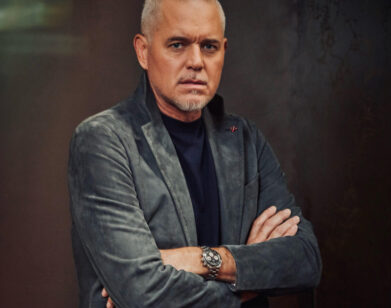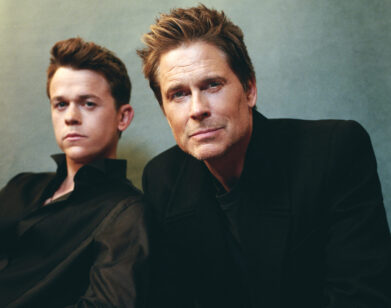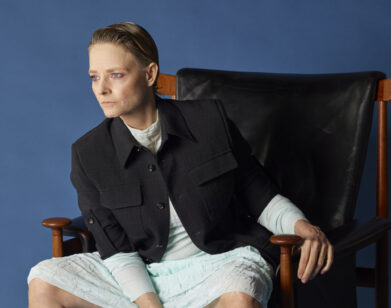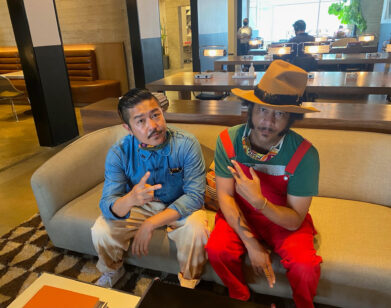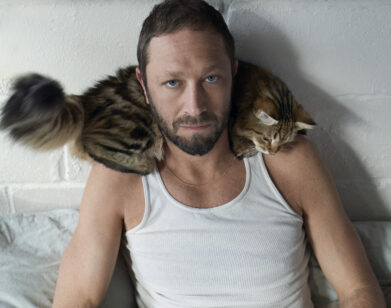In Conversation
Rebecca Breeds on Life at the Top of the Call Sheet
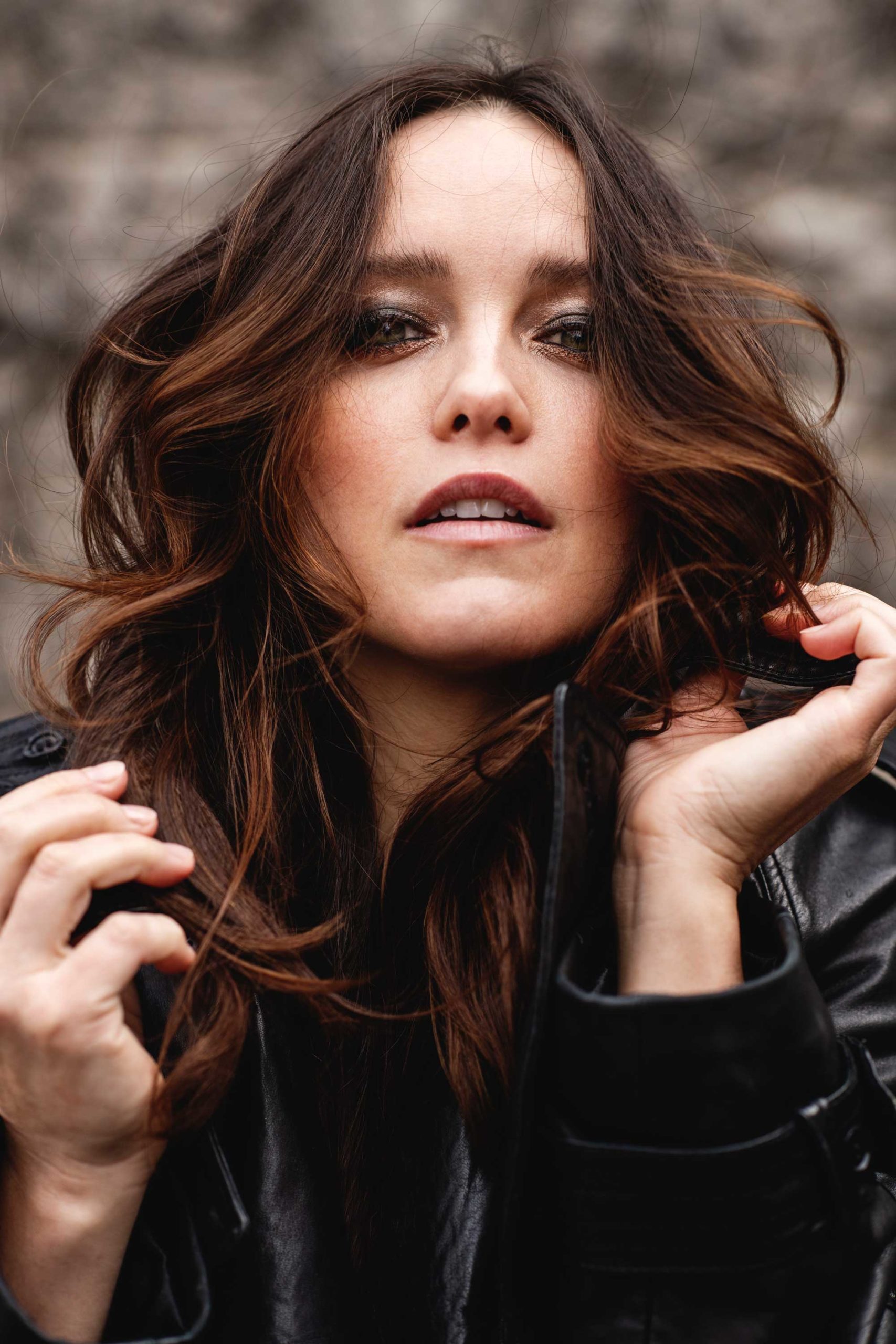
The 1991 film The Silence of the Lambs was one of the most gripping and influential works in the cinematic canon. But who is Clarice Starling, the character memorialized by Jodie Foster, beyond what boils down to “one very intense week in her life,” as Rebecca Breeds, the newest actor to take on the character’s mantle, describes the events of the movie? The CBS series Clarice aims to answer that, by picking up one year after the movie and following her case by case as she navigates a new assignment with the FBI’s Violent Criminal Apprehension Program (ViCAP), where she is the only woman on her not-entirely-welcoming team. Along the way, it also fleshes out Agent Starling’s backstory—one filled with abandonment and loneliness, but that has also forged her into the resilient person she is today. Ahead of season two’s move to the Paramount+ streaming platform, Breeds spoke with Jenny Lumet, the show’s co-creator, about staying true to her character, taking up space, and her secret dream to join the Tolkien universe. —EVELINE CHAO
JENNY LUMET: Here we are at the end of season one. I’m curious about your experience as number one on the call sheet. Because I don’t think many people know what that means.
REBECCA BREEDS: It’s funny. Growing up in the industry in Australia, I really disregarded numbers on the call sheet. When I got to America and the call was number one, I was like, “This hierarchy and ego—it doesn’t make any sense to me. We’re all in this together.” But now that I’m in it, I realize it’s a necessary structure. Because it is not just a number; it is an amount of work that you are responsible for, both on set and off. You are the one who sets the culture and the tone within the cast and crew, what is acceptable and the nature of your relationships. It is a great responsibility. And it can be done very right or very wrong.
LUMET: Very, very wrong.
BREEDS: It’s wonderful to be able to set the tone in that way. And because it comes from the top down, I feel so protected and supported and heard, by you and everyone all the way through. We’re all people who want to do something good and make the world a better place through art. So that trickles on to me, and then to everyone else.
LUMET: With COVID, this has not been a regular season of being number one. How has this whole experience surprised you?
BREEDS: I was worried that within the militancy of our COVID protocols—which are there to keep us safe and absolutely should be there—but that, with all the COVID officers on set, and the double masking, and the goggles and triple testing and all that stuff, we would lose a bit of heart. Because we’re not afforded the physical intimacy. We can’t sit there and talk face to face without some big mask on, or sit around a dinner table and clink glasses, or have in-person table reads. But what has surprised me is how, because of that, we’ve pushed harder into the intimacy. Because we have to reach each other with our hearts. And when we do get to be in each other’s presence, it’s very precious.
LUMET: What in you feels different after this year?
BREEDS: I’m really impressed to learn how efficient you can be, when you need to be. It’s like that saying, that if you want something done, ask a busy person. I get home at night and think, “How did I do that?” But it’s also taught me how important chill is. That’s a way the pandemic has been a blessing for me, because you can’t go and do anything. By the weekend, I’m so done that it’s a relief to be like, “Okay, for the next 48 hours, I may not leave the house. I may not leave the bed.” Because I’m a very sensitive person
LUMET: That’s why we cast you.
BREEDS: This is something I really responded to in Clarice. She’s really good at observing her environment, and I’m very sensitive to the environment. I can read a room and where people are at on an emotional level, and feel affected by it. And because I’m so sensitive to that, I know how important it is to create a good environment. Especially when we’re artists dealing with trauma, it needs to be safe and supportive and honest.
LUMET: When I watch you and the rest of the cast, I see such joy and affection. I keep wondering, wait, who’s the asshole? There’s always an asshole on set.
BREEDS: We keep waiting to find out. Everyone jokes, “Oh, it’s me. I’ll wait till you find out.”
LUMET: We’re trying to figure out who the hell it is in the writers room and we can’t. I’m like, “I like everybody. This is weird.” We can’t complain about anybody. And for writers, that’s like the worst ever; we have to have something to complain about and we don’t.
BREEDS: What is happening?
LUMET: Is there a difference between your imagination and Clarice’s imagination?
BREEDS: I think my imagination is more rainbows and sunshine. And Clarice’s is more based in survival: What do I have to do to get through this next day? What do I have to do to build a future for myself? I think Clarice growing up in orphanages, and the way her mother sent her off after her father died, she craves things that I’ve probably taken for granted in my life. I think she imagines a world in which she might belong somewhere, and feel safe. A world in which she is needed, necessary, and valued. Maybe that’s why she’s become the rescuer she is, because she wants to be indispensable.
LUMET: My dad [Sidney Lumet] used to tell a story about being a young director, directing a much more experienced actor, Ralph Richardson, on Long Day’s Journey into Night. My dad went into this long thing about what he needed from a scene, just, long, long, long, long. And then Ralph Richardson says, “Ah, so you’d like a little more cello and a little less flute?” And my dad goes, “Yeah,” and then slunk away back to his director’s chair, because that was it completely. So my question is: What do you think Clarice’s instrument is?
BREEDS: It’s funny you bring this up because whenever people ask me about Jodie Foster and Julianne Moore’s legacies, the way I answer is to say that Clarice has a song. There are quintessential characteristics that make up who she is and her path in this world. But, you can play that song on a violin, or a flute, or trumpet, and it will sound different. Julianne and Jodie were playing their instruments, and I can only play my instrument. So it’s the same melody, it’s the same notes, but it’s going to have its own musicality to it. If my Clarice was an instrument—
LUMET: Your Clarice, yes.
BREEDS: I would say a fiddle because it’s one of the most versatile instruments. It can be an absolute frenzy and bring you to gut-wrenching tears, but it can also be joyful and make you get up and dance. This is what I’m excited to explore with this show. In the films, we get some of her backstory, sure. But now we’re getting to see who she is outside of the very extenuating circumstances of one very intense week in her life. In the book, she has an incredible sense of humor. It’s very dry, and very dirty.
LUMET: Do you think that Clarice’s favorite curse word is fuck?
BREEDS: No, I think it’s shit. It just would come out so nicely.
LUMET: Yes, yes, yes.
BREEDS: Their sense of humor is amazing. We get glimpses of it in the book, but don’t really get to see in The Silence of the Lambs. But now, we get to extrapolate on that. This fiddle that is Clarice right now, we’re playing the trauma notes, but there’s a light at the end of that. She’s a budding young woman coming into the world and getting to know herself. We want to see what that’s like.
LUMET: I want an entire episode of Clarice shopping for her first home of her own. She’s always been a guest, at her uncle’s sheep ranch, at the orphanage, at UVA and the FBI Academy. How would Clarice even begin to know how to furnish her own home? Do you think she’d relish it? Or would she would be paralyzed in IKEA from too many fucking options?
BREEDS: Would she get a really soft couch and let herself sink into it? Does she find herself worthy of having a place to belong or not?
LUMET: Clarice also seems to have the most healthy and amazing relationship with her physical self.
BREEDS: I’m so glad you mentioned that. One of the most liberating things about this character is getting to expand our idea of what women are allowed to be on screen. I barely wear any makeup, and my hair’s everywhere, and we let the purple come through under my eyes. And we try not to cover my freckles. In fact, we have a secret where we add more, with a little freckle pen. We’re trying to add the humanity to her, not cover it up. It’s so liberating, because as an actress in this industry, so much of my career has been about, “You better look perfect and cover that up and enhance this.” But the moment you start worrying about that, you’ve gone wrong.
LUMET: You’ve gone wrong.
BREEDS: I can just focus on the work and the character. And that’s a rebellion for me. Like, hey industry, you know how my whole life, you told me it’s all about my physical appearance? Well guess what? I’m giving you the finger now because I’m going to be Clarice Starling, one of the most incredible female characters in literary and film history. And look at her. We’re not wearing makeup. We haven’t doused her in foundation and form-fitting clothings and perfectly coiffed hair. She just wants to do her job.
LUMET: It’s a tiny fuck-you.
BREEDS: It’s a big fuck-you.
LUMET: I’m excited to see Clarice’s sensuality in terms of the music she listens to, that she’s going to start listening to as she discovers it within herself. I was going to ask you about Clarice’s favorite song.
BREEDS: I want to see how she moves. I want to see if she dances.
LUMET: I think it probably takes a shot or two and then she’s a fucking maniac.
BREEDS: Yeah, a couple of moonshines. That’s been an interesting thing with me and Clarice because she is a very dot your i’s and cross your t’s, well-presented, “grew up in an orphanage so you better be polite” kind of person. It’s something that makes her good at her job. But I’m not as buttoned-up as she is. The reason I’m an actress is because I love to express. But with Clarice, I have to constantly walk that line of: How much are we cracking her open? Where can I let her get fiery and be a smartass? Season one, she’s really tight. I had to even be careful of how I walked. Maja [Vrvilo], our director, would be like, “Rebecca, you’re walking like Rebecca.” My arms would be flopping around. I keep challenging myself to be careful not to just make her Rebecca. I want to make sure that she stays very much Clarice.
LUMET: The writers room and production team is skewed female. I don’t know if that’s different for you from other shows you’ve worked on.
BREEDS: This is by far the most female environment that I’ve ever worked on.
LUMET: Does it make a difference in your day-to-day?
BREEDS: Massively. Because there’s a sense of humility with women. We’re doing the work and holding to the same standard that any other show would. But the environment is less whipcracky and “Just get on with it,” and more, “We’re going to do this in a way where you feel safe and supported. And let’s hold your hand and do it together.”
LUMET: There is a psychic toll to working in spaces that are very male or very Caucasian. There’s a level of negotiation you have to do simply to cross the street or ask for a cup of coffee. And having to negotiate that just to get your fucking job done, it makes you tired and hurts your soul. To be able to say, “I didn’t have to compromise to say the thing I wanted to say today. I didn’t have to be careful to let somebody else think it was his idea, or to not be viewed as a bitch or a cranky girl or a whiny girl. I said my thing to get the job done, and I didn’t have to fucking negotiate for the space for it” — you want to build that in the writers room. And it was our absolute hope that it would exist on set.
BREEDS: It does. And when you don’t have that environment, the actors can start to feel not safe. I’ve seen this on other sets before, where the environment is: “We’re making a show, and you’re lucky to have your job. So, turn up and do whatever we ask, and I don’t want to hear a word about it.” What happens is, you don’t feel safe to be vulnerable. And vulnerability is the core of what we do as artists. So people start phoning it in, and they start compromising on the depth and truth of their performance. So you undermine the power of the storytelling. You have to close up to protect yourself because too much is being pulled out of you without an equal amount of support or being heard.
LUMET: It makes me bananas when people don’t see how much concentration and effort, how much love and trust it takes for an actor to be in the moment. I think about it in terms of nutrition: You have to feed your actors. And nutrition is respect. Is what Rebecca is receiving from the entire team nutritious for her? If it is, then this actor will feel safe to give us back exactly what she wants to give us back.
BREEDS: And sometimes, you are malnourished or sick, and you need a doctor. And if you’re declined care, then you just get resentful, and self-protective, and defensive. And then, it becomes us versus them. I’ve seen it on other shows, where everything becomes a battle. It becomes this yucky energy where they don’t want to be there anymore. Or they can’t give you what you need because they’re unwell.
LUMET: The set becomes sick.
BREEDS: There’s nothing more demoralizing. Because what we’re doing should be beautiful. We’re all so privileged to be able to play make believe and indulge our imaginations. And have a fake rain machine and be like, “Whoa, we’re making it rain today and it’s not raining; this is crazy.” It’s a powerful thing. And to be part of making a set healthy is no small feat. It’s an incredibly delicate ecosystem. You don’t have to be all females to make a set run beautifully. But I do know we’re doing something right and it is a very female-driven environment
LUMET: As a final question, what other dreams and goals do you have? Me, I want you to play Clarice for the next 15 years.
BREEDS: I just want to play women that are full-bodied and that inspire me. But to be a little bit more specific, I do have a dream.
LUMET: Tell us.
BREEDS: I’m a bit of a Lord of the Rings nerd.
LUMET: Nerd.
BREEDS: I love adventure movies. And I always dreamed of playing Belladonna Took, Bilbo Baggins’s mom on the Took side. The Took are the ones that rode ponies and fought in wars. And she was this mad adventurer — his mother was the one he gets his adventure side from. She’s the ultimate female. And I’m like, why hasn’t there been a movie about Belladonna Took? I’m literally from the Shire in Australia. My parents are these tiny little British hobbit people, who went on a big adventure to Australia. So, I want the big feet. I want the hobbit ears. And I want to go on this giant adventure into Middle Earth and save the fucking day. Peter Jackson, I don’t know if you’re listening. But I think we need to tell Belladonna Took’s story.
LUMET: That is the coolest thing I’ve ever heard in my entire life. All right, we’re going to speak it into existence. I mean, Rebecca, at this point, I can see you playing Genghis fucking Khan.
Makeup by Jodi Urichuk, for Plutino Group. Fashion Direction by Corey Ng for P1M. Hair by Justin German for P1M / Bang Salon. Nails by Leeanne Colley for P1M / Tips Nail Ba.

